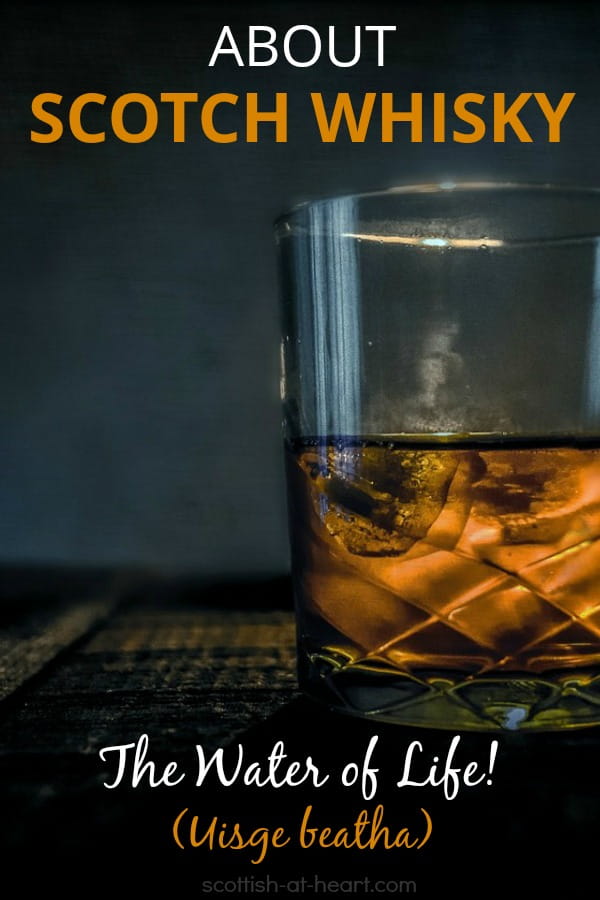Scotch Whisky
Scotch Whisky is a world-famous spirit, and it's reputation is well deserved.
Whisky or Whiskey?
In the land of it's birth this national drink is spelled Whisky (without the 'e').
Wales, Canada, Japan and many other countries spell it this way too. However, the Irish spelling is Whiskey, and the same spelling is seen in the USA.
This difference is believed to date back to the late 19th century when the Irish and Scottish distilleries wanted to show a distinction between their products.
About Scotch Whiskey
At the risk of sounding obvious, Scotch Whiskey has to be thoroughly Scottish in order to have the honor of claiming that title!
And that means that it needs to be produced (distilled) and matured in Scotland, and nowhere else. The Scots are so proud, and protective of, their wonderful creation that they have international protection of the term 'Scotch'.
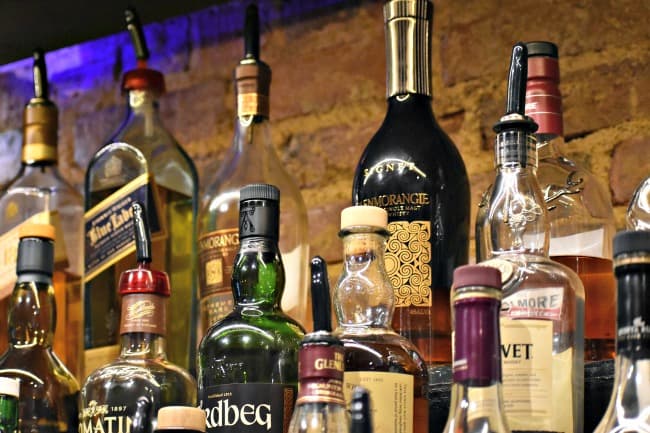
Scotch can only come from Scotland!
Any whiskey that has the word 'Scotch' in it's name HAS to have been manufactured in Scotland.
True Scotch Whisky reflects the land of it's birthplace, and the people who created it, in many ways.
It is traditionally made from barley and pure, clear water - both of which are in plentiful supply in Scotland.
It also needs a cool, damp or moist environment in order to mature properly, again there's plenty of cool weather and moisture in Scotland!
Scotland is a country which historically has proven it's strength and courage and fought fiercely for it's independence.
So perhaps it's no surprise that Scotch Whisky is a drink which could be described as bold, strong and fiery... although it can also be smooth, almost sweet, a drink of depth and contrasts - just like Scotland itself!
The famous Scottish poet Robert Burns recognized this when he wrote 'Whisky and freedom gang thegither' (means whisky and freedom go together'.
In the UK, Scotch Whisky is consistently a top export (accounts for just under a quarter of the UK's food and drink exports), adding millions of pounds sterling to the economy each year.
In the USA, the people's taste for 'Scottish Scotch' is growing each year, and the premium Scottish brands are becoming more and more popular.
In England, a cup of tea is the answer to all life's little (and not so little) problems. In Scotland, whisky plays the same role. Whether it's a birth, wedding, funeral - or a 'hot toddy' to help you get over a bad cold/flu, historically it's a 'wee dram' that the Scots rely on.
History of Scotch Whisky
No one knows for sure exactly when 'Scotch' was first distilled in Scotland, but there is still a of really interesting stuff that we do know!
Some historians think that Heather Ale, a popular drink brewed by the Picts and other very early inhabitants of Scotland, may have been a 'prelude' to Scottish whisky.
There's evidence to suggest that this type of ale was brewed as early as 2000 BC, but of course it was very different in taste, alcohol level etc.
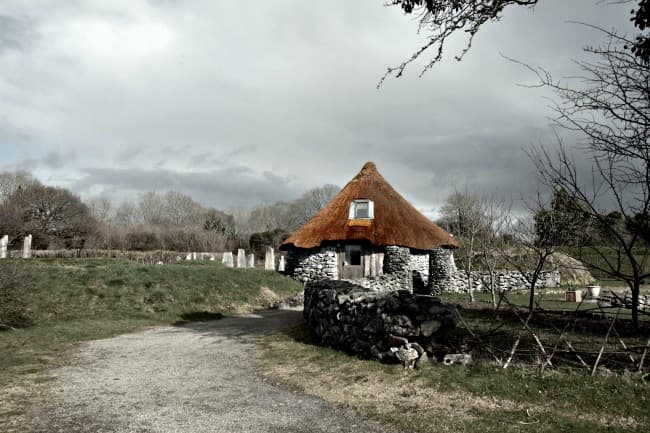
Hundreds of years ago, the ancient Celts distilled an alcoholic drink whose Scottish Gaelic name was uisge beatha (latin name 'aqua vitae' meaning 'water of life').
Due to the pronunciation of this name, it gradually changed over time and with each invasion or influx of 'foreign, to 'usky' and then to 'whisky'. The spirit itself developed and changed too, eventually becoming the Scotch Whisky of today.
There's no actual written record of the distilling of Scotch prior to an entry in the 'Exchequer Rolls of Scotland' in 1494 which read... 'To Friar John Cor, by order of the King, to make aqua vitae VIII bolls of malt'.
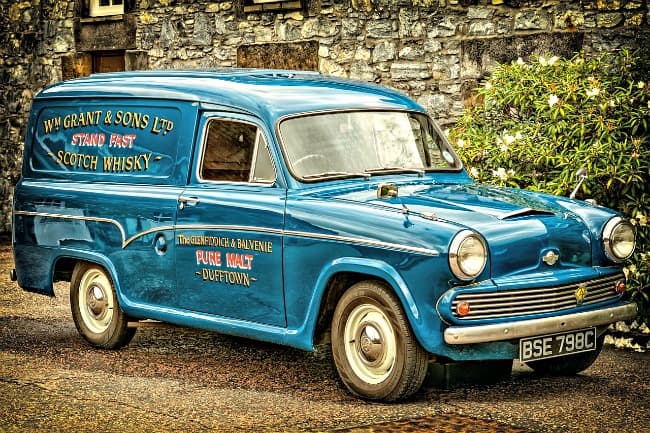
Although this early Scotch whisky may not have been intended as a social drink - it was more likely used for medicinal purposes - it is the first recorded reference to the distilling of whisky in Scotland.
The number of whisky distilleries in Scotland has risen and fallen since this first historical mention, with taxation in the 17th and 18th centuries causing a drop in 'legally established' distilleries and a rise in illicit production and a thriving black market.
The Glenlivet Distillery, established by George Smith in the 19th century, is thought to be the oldest legal Scottish distillery, and recent archaeological finds suggest it could have produced as much as 6 hogsheads (just over 400 gallons) of whisky per week.
In the mid 19th century whisky production was moved to a new, and larger, facility a mere half a mile from the original one. Glenlivet continues to be a world-renowned whisky, and one of Scotland's famous exports.
How Scotch Whisky is Made
The different types of Scotch whisky, and how they're produced is actually pretty complicated.
There are 3 basic types of 'Scottish Scotch'
- Single Malt Scotch Whisky - which is made at a single distillery using only barley and water
- Single Grain Scotch Whisky - which is made at a single distillery from barley and water, and the addition of one, or several, other grains.
- Blended Scotch Whisky - this is produced by blending single malt scotch whisky with single grain scotch whisky. There can be only one single malt and one single grain, or several of each. The ratios of grain whiskies to malt whiskies is usually around 60:40
Did you catch it? When you see the word 'Single' on a Scotch whisky bottle it means that it was produced at a single distillery.
There are also other categories and sub-categories such as 'blended malt whisky', 'vatted malts' and 'blended grain whisky'.
The distilling process by is also very complex. Here's a brief explanation of the way Scotch whisky is manufactured...
- Malting - This is the process which turns barley grain into malted barley. It is then dried and roasted, Scottish peat is often used in the part of the process and gives the finished product a distinctive flavor and aroma.
- Mashing - When the malted barley is ground/crushed and mixed with hot water to produce a liquid called 'Wort'. This is basically a sugary solution which is the basis for the whisky spirit.
- Fermentation - At this stage yeast is added to the Wort solution and left to ferment, usually for about 36 hours.
- Distillation - This process 'purifies' the spirit that has been produced so far.
- Maturation - During the period of maturation, the whisky is stored in oak caskets or barrels for a minimum of 3 years. It can't be sold as whisky at this young age, but can be used in blended whiskies. Scotch needs to have matured for a minimum of 8 years before it can be marketed.
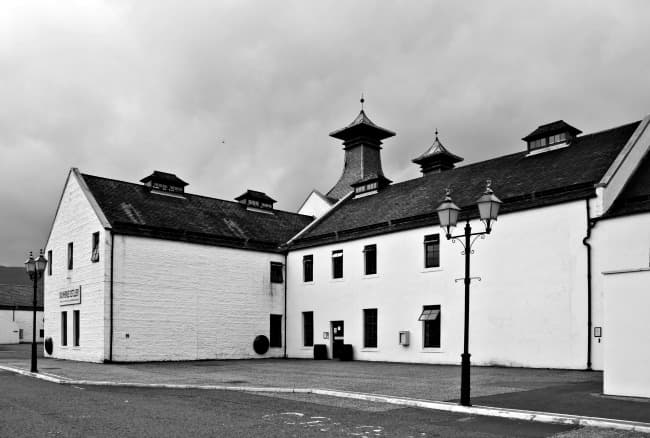
Scotch Whiskey - Whisky Regions & Distilleries
In terms of distilleries, Scotland was historically divided up into four regions - The Lowlands, The Highlands, Islay, Campbeltown. The many small islands off the coast of Scotland are included in the Highland region.
A fifth region was added, known as 'Speyside'. This also used to be part of the Highland region, but due to the large number of distilleries there it is now recognized as an individual region.
Each region produces Scotch that may be different in taste, color and aroma. But there are also differences between Scotch Whiskies produced in the same region by different distilleries, or even the same distillery. There's literally something to suit every taste :)
Here's a quick look at these regions:
The Lowlands - Currently there are only 3 whisky distilleries still in operation here - Auchentoshan, Bladnoch and Glenkinchie. Scotch Whiskey from this region tends to be the lightest and sweetest.
The Highlands - Geographically a huge area, this region is home to more distilleries than any other. Not surprisngly, the whiskies produced here are quite diverse. There's no one-size-fits-all description, but in general Highland whisky is smooth, medium to full bodied and has a great aroma. Some of the most famous Scotch whisky distilleries are here, including Clynelish, Dalmore, Glenmorangie and Oban.
Speyside - This region also houses many world-famous whisky distilleries, in fact over half of Scotlands' malt whisky distilleries are in this area. They include Cragganmore, Dalwhinnie, Glenfiddich and Glenlivet. The whiskies distilled in Speyside are similar to those produced in the Highland region.
Islay - There are 8 distilleries in operation in the Islay region, including Bruichladdich, Bowmore, Laphroaig and Laguavulin. The Scotch produced here is quite distinctive, with a strong flavor imparted by the peat used in the drying process.
Scotch Whisky - Trivia
- The earliest whisky distilleries were usually on farms, or operated by agricultural or farm workers, and the distillery duties had to fit around farm chores. Because of they were only operational for part of the year (post harvest until Spring). Today, many distilleries are still closed during August.
- Due to high taxation, in the mid 18th century, there were approx fifty times more illegal whisky distilleries than there were legal ones
- Scotch whisky has, by British law, to contain a minimum AVB (alcoholic strength by volume) of 40%
- The age of the whisky stated on a bottle is the age of the youngest whisky in that product.
- Whisky only matures while in the cask/barrel, it doesn't mature any further once bottled
- The first blended whisky made for commercial use was distilled in 1853 and carried the 'Glenlevit' label
- The 'Johnnie Walker' label has two of the best selling Scotch Whiskies in the world (the 'Red Label' and the 'Black Label')
Best Scotch Whiskies...
You can drink Scotch whisky just as it is (neat), or you can just add ice (on the rocks), or water (use bottled spring water not tap water). Or perhaps ginger ale, coca-cola or whatever soft drink you prefer.
Dedicated scotch drinkers may insist that a single malt scotch should be drunk neat, with only a drop or two of water. However, blended scotch can be served over ice, or with more water and still be acceptable to 'connoisseurs'.
It's really impossible to pick the 'Best Scotch Whisky', as taste is a very individual thing, and there's such a huge variation of flavors. However, if you want the names of a few Scotch whiskies that are 'contenders', here are a couple of lists you may be interested in....
According to British newspaper 'The Independent' these are the top ten Scotch Whiskies...
- Johnnie Walker Black Label 40 per cent AVB a firm favorite with scotch drinkers the world over. Probably the best blended scotch whisky ever
- Lagavulin 16 Year Old (an Islay Malt) 43 per cent AVB a perfect all-round scotch
- The Glenrothes 1985 (Speyside) 43 per cent AVB ... perfect accompaniment to a good steak or roast beef
- Old Pulteney 12 Year Old (N Highland Region) 40 per cent AVB .... a good choice for a seafood/fish dinner
- Clynelish 14 Year Old (N Highland Malt) 46 per cent ABV tastes especially good when it's served REALLY cold with dessert
- Auchentoshan 18 Year Old (single malt from Lowland region) 43 per cent AVB good pre-dinner drink
- Asyla (a blended Scotch) 40 per cent ABV .... another good pre-dinner 'tipple'
- Highland Park 18 Year Old (Orkney Islands) 43 per cent ABV... good choice for dessert time
- Bailie Nicol Jarvie (blended whisky from the Highlands) 40.0 per cent AVB.... named after a character in Walter Scott's novel, 'Rob Roy'
- Talisker 10 Year Old (Isle of Skye) 45.8 per cent ABV .... best choice for traditional dishes such as haggis. Robert Louis Stevenson called it the 'King of drinks'
Just to show you how subjective choosing a 'best scotch whiskey' can be, here are what forbes.com consider to be ten of the best...
- Bowmore 1964, Bourbon Cask (Islay)
- Clynelish 20 year old, 1983 (Highland)
- Caol Ila, Old Malt Cask, 24 year old (Islay)
- Bruichladdich XVII (Islay)
- Cragganmore 29 year old (Speyside)
- Macallan 12 year old (Speyside)
- Dalwhinnie 29 year old (Highland)
- Glenmorangie 15 year old (Highland)
- Rosebank 1991 Signatory (Lowland)
- Glenkinchie 10 year old (Lowland)
Well, hopefully you're still with us, and as you now know more about Scotch whisky than most people you'll ever meet, all you have to do is start tasting them. We hope you enjoy yourself :o)
Related Pages:
- Home
- Scotch Whisky
